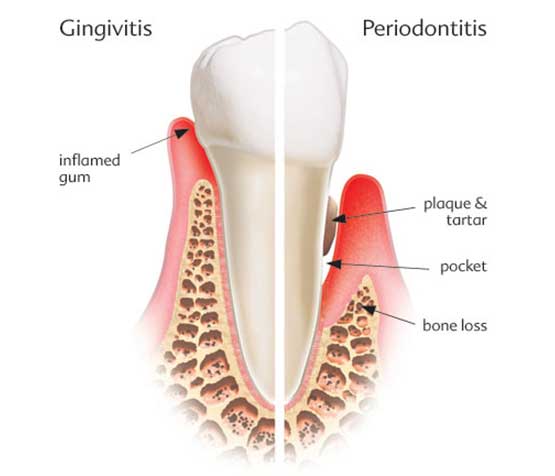It is important to know that Gum Disease, also known as periodontitis or periodontal disease takes many forms and presents with different levels of severity. If left untreated, periodontitis can eventually lead to tooth loss and other potential health problems. There are several types of periodontal disease that our patients should be aware of:

Gingivitis
One of the most common types of periodontal disease is called Gingivitis. Gingivitis causes your gums to become red and swollen. They may also tend to bleed easily. At this stage, you may experience little or no discomfort. Gingivitis is usually caused by an inadequate oral hygiene regimen. It is usually reversible with professional treatment and good oral hygiene habits such as regular brushing and flossing.
What Causes Gingivitis?
Gingivitis is caused by factors such as:
- Improper or infrequent brushing and flossing habits
- Diabetes
- Smoking
- Aging
- Disease
- Stress
- Genetics
- Pregnancy
- Hormones
- Infection
- Medication Use
What is Periodontitis?
The advanced form of Gingivitis is called ‘Periodontitis.’ Periodontitis is considered to be one of the more serious types of periodontal disease. When left untreated, gingivitis can advance to the point where the plaque spreads below the gum line. This causes the toxins produced by the bacteria in plaque to irritate the gums themselves. The body reacts by producing an inflammatory response which causes the body to essentially turn on itself. If left untreated, the result is that the tissues supporting the bone – and therefore the teeth themselves – are broken down and destroyed.
Your gum tissues separate from the teeth and form what is known as ‘pockets.’ These pockets are essentially spaces between the teeth and gums that have become infected. As periodontitis progresses, these pockets deepen so that more gum and bone tissue is destroyed. Your teeth may eventually become loose and may even have to be removed as there is no longer any bone structure remaining to hold them in their proper place.
What are the Types of Periodontitis?
The common Types of periodontitis include the following:
- Aggressive Periodontitis: Occurs in patients who are otherwise clinically healthy individuals. Common symptoms include rapid attachment loss with bone destruction.
- Chronic Periodontitis: This is the most frequently occurring form of periodontitis and is characterized by pocket formation and/or recession of the gingiva (gum line). It results in inflammation within the supporting tissues of the teeth and subsequent bone loss. It is prevalent in adults but can occur at any age. Progression of the attachment (teeth) loss usually occurs slowly, but periods of rapid progression can occur.
- Periodontitis (A Manifestation of Systemic Diseases): This often begins at a young age. Systemic conditions such as heart disease, respiratory disease, and diabetes are all associated with this form of periodontitis.
- Necrotizing Periodontal Disease: This is an infection characterized by necrosis (death) of the gingival tissues, periodontal ligament, and alveolar bone. The usually appear as lesions and are most commonly observed in individuals with systemic conditions such as HIV infection, malnutrition, and immunosuppression.
At Peace Periodontics, we specialize in diagnosing and treating all of the types of periodontal disease. If you have been referred to see a periodontist or if you suspect you are experiencing the symptoms of periodontal disease, we invite you to contact us for an appointment.
To learn more about Periodontitis, we invite you to contact Peace Periodontics to schedule a consultation appointment.
Featured Periodontal Services
Testimonial
Contact Us
Working Hours
| Monday: | 8:00 am – 5:00 pm |
| Tuesday: | 8:00 am – 5:00 pm |
| Wednesday: | 8:00 am – 5:00 pm |
| Thursday: | 8:00 am – 5:00 pm |
| Friday: | 8:00 am – 2:00 pm |
| Saturday’s, Sunday’s & Statutory Holidays: |
Closed |
